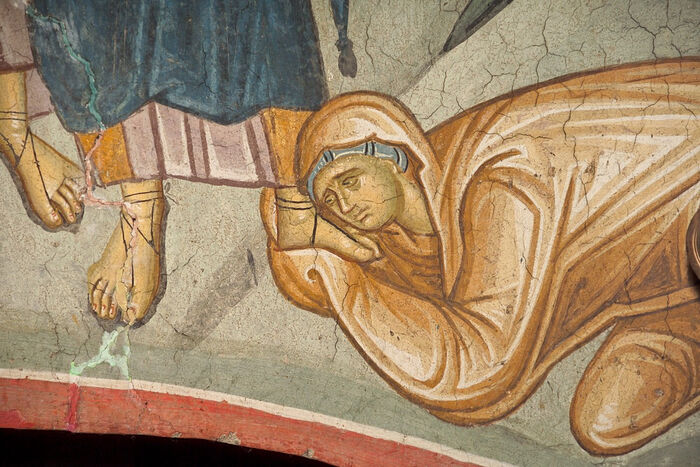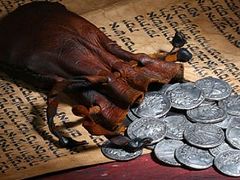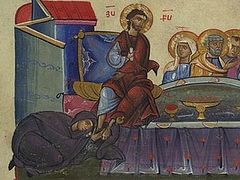On Holy and Great Wednesday, the Holy Church commemorates the sinful woman who poured myrrh on the Lord’s feet at the house of Simon the Pharisee. This event occurred shortly before the Lord’s voluntary Passion. The Lord promised that wherever this Gospel is proclaimed, her deed will be remembered as a memorial unto her. There are two separate events in the Gospel wherein Christ’s feet are anointed with myrrh besides the one I mentioned: One sinful woman anointed Christ’s feet at a dinner given in his honor at the home of Simon the Leper, and another virtuous woman, Mary, the sister of Lazarus, anointed Christ’s feet six days before the Passover—that is, on Palm Sunday evening—at a dinner given in his honor in Bethany. This event occurred two days before the Passover—on Great and Holy Wednesday—and despite the opinions of some, the Synaxarion of Holy Wednesday clarifies that it is most likely that Simon the Pharisee and Simon the Leper are two distinct individuals and not one and the same. The Aposticha of the Bridegroom Matins on this day (chanted on Tuesday evening) mention that, in this instance, we are referencing the particular anointing that occurred at the home of Simon the Pharisee. The hymns of Bridegroom Matins, and the hymns we shall subsequently hear on Holy Thursday evening at the Twelve Gospels, contrast this generous anointing—it was a costly, precious, pure myrrh, with a great amount poured for the whole flask was “shattered”—to another act which took place on this day, on Holy Wednesday: the act of Christ’s betrayal by Judas. The harlot stretched forth her hair before Thee, O Master, while Judas stretched forth his hands to the lawless ones: she did so, to receive forgiveness; and he, to receive money. The metaphorical road of life has two lanes: one leading to Christ and the other leading away from Him. This is the dilemma of every soul which comes into the world: Will we follow Christ, or will we betray Him?
Though Judas beheld the miracles and wonders, he thought—certainly driven by envy and damnable jealousy—that is would be a profitable venture to betray Jesus into the hands of the lawless. We are informed by the Holy Gospels that for the cause of raising Lazarus from the dead and for entering the Holy City in triumph immediately after that event as the King of Israel, and for accepting the praise, “Hosanna in the Highest”, from the babes and children, the Scribes and Pharisees set their will and disposition to capture Jesus and to kill Him. Yet this would be impossible in broad daylight, when the Lord preached in the temple both on Holy Monday and on Holy Tuesday. The protest and unrest caused from such a capture and the bloodshed spilled would surely be viewed by the Romans as an act of extreme carelessness, which might event lead to a revolution, with many held responsible for their obvious role. These wicked ones needed darker methods to capture the Lord. The Holy Gospel teaches us that then Satan entered Judas, one of the twelve, and he went to the high priests and Pharisees saying, what will you give me and I will betray Him unto you? And they set the price of the priceless One, thirty pieces of silver, as prophesied by Zachariah: I told them, "If you think it best, give me my pay; but if not, keep it." So they paid me thirty pieces of silver. And the Lord said to me, "Throw it to the potter”—the handsome price at which they valued me! So I took the thirty pieces of silver and threw them to the potter at the house of the Lord. This is how lawless Judas acted. And this is how the lawless Scribes and Priests and Pharisees conspired. And how many in our generation have betrayed Christ for much less? Do we not betray Him for less when we deny material aid to those less fortunate? Or when we, as a society, preach that the meaning of life is to be found in the “pursuit of happiness”—are these not qualities that betray Christ, since they are in stark contrast to His teachings and His examples?
On Holy Thursday at the first Gospel we will hear, if you love me, keep my commandments, and, I have called you friends, not servants. Holy Wednesday is intrinsically about faithfulness and faithlessness. At Matins, we also heard: Great is his slothfulness, but from her—what great repentance! The Churches resonated last night with hymns that glorify a harlot and condemn the betrayer, the seemingly faithful disciple! The faithlessness displayed by Judas stemmed from a darkened heart, a heart that was steeped in confusion and jealousy. Though the harlot in her life indulged sensual pleasure, she overcame herself and her sinful passions; she realized that internally something was extremely disjointed, and she sought healing through repentance. She invested in Christ generously, having no thought for the funds spent. She poured out extremely valuable myrrh on his feet, worth a lifetime’s fortune. And the Church sings that she, for her generosity, received remission of sins and offenses. Beholding this, Judas said, Could not this myrrh be sold and the proceeds given to the poor? Thus he showed his lack of depth, his lack of sincerity, his lack of a complete, Christ-centered existence. For him, show and impressions where the things that mattered most, and not a genuine disposition. He did not understand Christ’s answer: She did this to prepare me for my burial. The poor you will always have with you, but you will not always have me with you.
There are two things the woman did that we do not practice: The first is that she gave Christ her sincere repentance. Many confess a list of items, but there is no real, life-alternating repentance. We condition ourselves in our subconscious to believe that the sacrament of Confession is also available next week, and if I do something wrong, well, that’s okay since I am only human. I’ll just “repent” and go again. This is a psychological dependence, a psychological need to feel “forgiven” and cleansed while we do not actually engage in any practical repentance and change. It’s alright to confess weekly, so long as a genuine struggle is occurring. The second thing the woman practices is selfless giving: She poured out what was most valuable on Christ’s feet, to the bewilderment of all those present. Now, how many of us give selflessly to the Holy Church, for the needs of the Holy Temple, for the Temple’s adornment with beautiful flowers and arrangements on these sacred days? How many of us are spending time here and there, and funds here and there, all on ourselves, but for Christ: Here are five dollars for the flowers of the Epitaphios, and perhaps I will go hear a gospel or two on Holy Thursday, and maybe I can glimpse the Epitaphios going around on Holy Friday evening, and then light my candle at Pascha Midnight at Come Receive the Light, hear a “Christ is Risen” once or twice, and then I’ve done my part and played my role and I am a good Christian. Was this not our attitude all these years? We heard about these saving events in the Gospel, and in our subconscious, we associated ourselves with the sinful woman, with the Myrrhbearing women, and the other righteous ones; that is, we associated ourselves with the protagonists. Yet does not our innate behavior display our affiliation with the antagonists, with Judas, with the faithless disciples who scattered at the Passion, with Pilate, and with Herod?
This is Great and Holy Wednesday. And yet, many of us now, during these sacred days—when restrictions are in place both in Europe and here, in North America—will not have the opportunity to listen to a “Gospel or two” on Holy Thursday; we will not see Christ’s Epitaphios process on Holy Friday night, and we will not hear the priests singing, “Christ is Risen” triumphantly on the night of Pascha. Indeed, for many of us, it will be impossible to even commune of the sacred and Holy Mysteries. We should take the lesson to heart this time, for I fear darker days and seasons are ahead of us, and we are in sincere need of true faith—of the Orthodox Faith—and pure repentance, as displayed by the sinful woman whom the Holy Church commemorates today. Often, we have followed the example of Judas with our actions, but now let us flee from such unbecoming and cowardly conduct. For our sincerity and true repentance, perhaps the Lord will be merciful to us. When the Churches re-open and we are once again, God willing, able to attend the Divine Services of Holy Week in 2022, perhaps we will do so in utmost sincerity, paying close attention to the psalms and hymns and the readings; and furthermore, deeply internalizing Christ’s Passion and suffering that He endured for us. Let us sincerely pray to the Lord that He grant us the love of the sinful woman. This is a pure and Holy love, ready to sacrifice and to suffer. It is only with this pure love that we can participate in the Sublime Passion and Resurrection of our Lord and Savior in a profound and spiritual manner. It is only with this love that the words we sing on the Paschal night can truly resonate from hearts transfigured by the saving grace of holy repentance: O, Thy divine, beloved and Thy sweet voice, Thou hast truly promised that Thou wouldst be with us, until the end of Age, O Christ! Through His mercy and grace, may we pass the remaining time of these solemn days faithfully, and attain to the worship of His Holy Resurrection on Holy Pascha in purity of heart.




